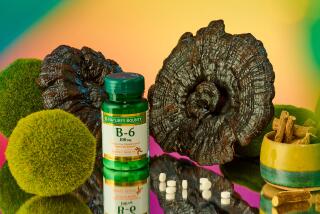For many gymgoers, energy comes in a can
- Share via
Sara Vieira’s workout schedule is more than most humans care to endure, a punishing combination of Spinning classes, boot camp and training for an upcoming triathlon. Exercising intensely up to two hours a day, Vieira admits she can endure the workouts a little easier when she has help from a friend -- a can of Red Bull.
The 27-year-old flash designer from West Hollywood is hardly alone. Many twenty- and thirtysomethings regularly chug energy drinks or coffee before their workouts.
“It gives me so much energy,” says Vieira, whose fondness for the beverage earned her the nickname Red Bull. She got her first taste of the stuff five years ago, after suffering from jet lag and incorporated it into her workouts a year later. “You feel like you can go that extra mile. I’m more focused as well.”
She may be right. Despite previous warnings about the possible diuretic effects and dehydration risks of caffeine -- the key ingredient in energy drinks -- the stimulant can have a positive effect on athletic performance, research has shown. One study showed that among approximately 10 well-trained elite athletes, ingesting caffeine increased the length of time they could sustain an intense workout by 20%.
While higher levels of caffeine did sometimes produce side effects such as jitteriness, “the performances still improved with the smallest dose of caffeine,” said study co-author Lawrence Spriet, professor of physiology at the University of Guelph in Canada.
Caffeine boosts energy because it stimulates the nervous system and helps release fat cells, giving the body energy it can use immediately.
Other studies of energy drinks have been less conclusive. One showed that the drinks had no effect on repeated anaerobic cycling performance, although they did increase resting and exercise heart rates and post-exercise lactate levels.
The amount of caffeine in the drinks varies, and the labels don’t always specify. Some drinks simply list guarana, a natural source of caffeine. To compare, Red Bull weighs in at 80 milligrams of caffeine; most colas have about half that, and an 8-ounce cup of coffee has anywhere from 80 to 175 milligrams of caffeine, depending on how it’s brewed.
Dr. David Heber, director of the UCLA Center for Human Nutrition, says caffeine is generally safe, although peoples’ sensitivities to the substance vary. If caffeine’s properties of boosting energy and increasing mental alertness can help motivate someone to get to the gym, all the better, he says.
Obviously symptoms such as dizziness and the shakes should be a warning sign to stop consuming, and anyone with a preexisting heart condition or on heart medication should check first with their physician.
Vieira swears by the stuff.
“If I drink a Red Bull, I know I’ll have the energy I need to do a double spin class, or 90 minutes of yoga,” says Vieira, who abstains from coffee. “I don’t get tired.” Family and friends have tried to get her to quit for good. “They tell me I can use my own energy and I don’t need to be dependent on caffeine. But I’m like, listen, you don’t do two spinning classes back to back.”
West Hollywood trainer Scott Mahoney, 37, has been hitting energy drinks for about a year and a half, starting with stronger formulas that he found “lasted way longer than the workout. I’d feel all jittery and they’d make me very speedy.” The one he favors now, Piranha, cranks up his energy level for about 90 minutes but doesn’t make him crash when it wears off, he says. Like Vieira, he doesn’t drink any coffee, saving the power surge for the energy drinks.
He warns clients about the potent effects of some of the beverages, but sanctions milder versions as a pre-workout pick-me-up.
Vieira’s boot camp instructor Marco Reed wishes his students and personal training clients would cut back on caffeine and energy drinks and use their body’s own adrenaline to get through workouts. Reed often sees gymgoers tanking up before or during workouts. “They’re coming down from their workout and they’re really tired, so they’ll have another one,” he said, leading to a roller-coaster effect he feels is unhealthy.
Trainer Andrea Orbeck takes a more laissez-faire approach. She’s a two-cup-a-day coffee drinker and doesn’t preach anti-caffeine messages. “Most of my clients are in their late 20s and they’ve been doing caffeine their whole life,” she says. “It’s an agent that normally helps them, and it helps me too.”
So although that Starbucks venti drip or bright can isn’t going to turn a weekend warrior into an Olympic-style sprinter, die-hards like Vieira don’t mind. “When I don’t drink it, I have headaches and I’m not focused -- at least for the first three days,” she says. “But the moment I drink it, I’m in paradise.”






